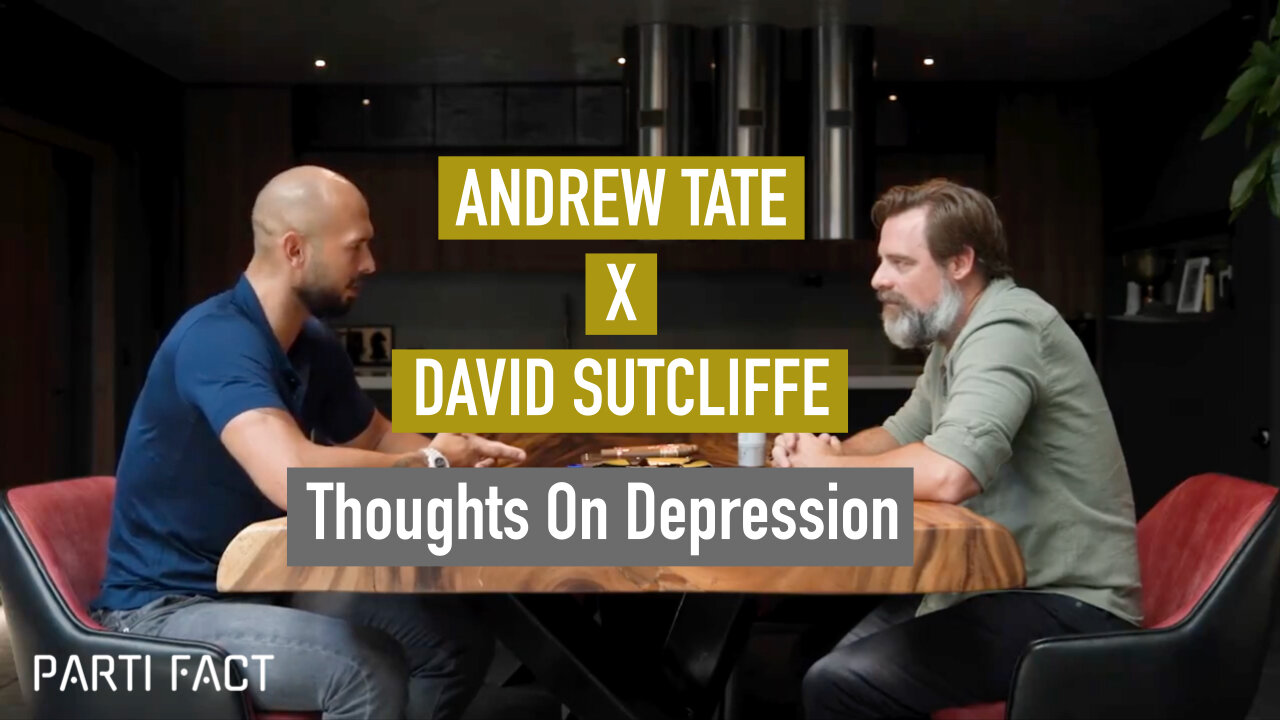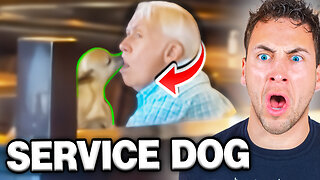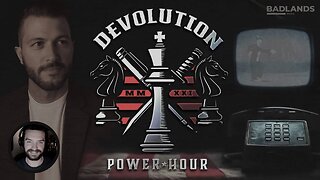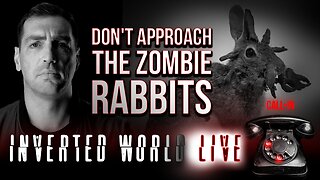Premium Only Content

Andrew Tate X David Sutcliffe - Thoughts on Depression #tatelegacy #davidsutcliffe #respect #mindset
Depression is a mental health disorder characterized by persistent feelings of sadness, hopelessness, and a lack of interest or pleasure in activities. It goes beyond the normal ups and downs that everyone experiences in life and can significantly impact a person's thoughts, emotions, behavior, and physical well-being.
Symptoms of depression can vary but commonly include:
1. **Persistent Sadness**: Feeling sad, empty, or tearful most of the time.
2. **Loss of Interest or Pleasure**: Losing interest in activities or hobbies that were once enjoyable.
3. **Changes in Appetite or Weight**: Significant weight loss or gain, or changes in appetite.
4. **Sleep Disturbances**: Insomnia (difficulty sleeping) or hypersomnia (excessive sleeping).
5. **Fatigue or Lack of Energy**: Feeling tired and lacking energy, even after rest.
6. **Feelings of Worthlessness or Guilt**: Feeling worthless, guilty, or excessively self-critical.
7. **Difficulty Concentrating**: Trouble focusing, making decisions, or remembering things.
8. **Psychomotor Agitation or Retardation**: Restlessness or slowed movements and speech.
9. **Physical Symptoms**: Unexplained aches, pains, or digestive issues that don't respond to treatment.
10. **Thoughts of Death or Suicide**: Recurrent thoughts of death, dying, or suicide, or suicide attempts.
Depression can be caused by a combination of genetic, biological, environmental, and psychological factors. It affects people of all ages, genders, and backgrounds, and it can occur as a single episode or recur throughout a person's life.
It's important to note that depression is a serious medical condition that requires proper diagnosis and treatment. Treatment options include psychotherapy (talk therapy), medication, or a combination of both. If you or someone you know is experiencing symptoms of depression, it's crucial to seek help from a qualified mental health professional.
Combatting depression involves a multi-faceted approach that combines various strategies to improve your mental health and well-being. It's important to remember that different approaches work for different individuals, and it's advisable to consult with a mental health professional before making significant changes. Here are some general strategies that can help combat depression:
1. **Seek Professional Help**: A qualified mental health professional, such as a psychiatrist, psychologist, or therapist, can provide an accurate diagnosis and develop a tailored treatment plan that may include therapy, medication, or a combination of both.
2. **Therapy**: Psychotherapy, such as cognitive-behavioral therapy (CBT), dialectical behavior therapy (DBT), or mindfulness-based therapy, can help you learn coping skills, challenge negative thought patterns, and develop healthier ways of thinking.
3. **Medication**: In some cases, antidepressant medications prescribed by a doctor can help alleviate symptoms of depression. It's important to work closely with a healthcare provider to find the right medication and dosage for your needs.
4. **Lifestyle Changes**: Making positive changes to your daily routine can have a significant impact on your mood. This includes regular exercise, maintaining a balanced diet, and getting enough sleep.
5. **Social Support**: Connect with friends, family members, or support groups. Talking about your feelings and experiences with others who understand can provide comfort and reduce feelings of isolation.
6. **Mindfulness and Meditation**: Mindfulness practices, such as meditation and deep breathing exercises, can help reduce stress and promote a sense of calm and self-awareness.
7. **Engage in Enjoyable Activities**: Even when you don't feel like it, try to engage in activities you once enjoyed. These activities can help boost your mood and provide a sense of accomplishment.
8. **Set Realistic Goals**: Break down your tasks into smaller, achievable goals. This can help you build a sense of accomplishment and prevent feeling overwhelmed.
9. **Limit Stress**: Identify sources of stress in your life and work on managing them. Techniques like time management, setting boundaries, and learning to say no can be helpful.
10. **Limit Alcohol and Substance Use**: Alcohol and drugs can exacerbate depression symptoms. Reducing or avoiding their use can improve your mental well-being.
11. **Create a Supportive Environment**: Surround yourself with positive influences and avoid toxic relationships or environments that contribute to negative feelings.
12. **Educate Yourself**: Learn more about depression, its causes, and treatment options. Understanding the condition can empower you to make informed decisions about your health.
13. **Professional Development**: Engage in activities that promote personal growth and a sense of accomplishment, such as learning a new skill or pursuing a hobby.
14. **Routine and Structure**: Establishing a daily routine and structure can provide a sense of stability and purpose.
-
 10:48
10:48
Nikko Ortiz
14 hours agoDont Watch These TikToks
1.78K5 -
 10:17
10:17
MattMorseTV
13 hours ago $9.21 earnedTrump's DOJ just DROPPED a NUKE.
55.6K59 -
 2:09:32
2:09:32
Side Scrollers Podcast
16 hours agoStreamer DIES Live On Air + Your Food is Poison + Xbox Announces $900 Handheld | Side Scrollers Live
4.17K5 -
 15:32
15:32
GritsGG
12 hours agoFull Auto ABR Sniper Support! Most Winning Quad Win Streaking!
1.07K1 -
 7:42
7:42
The Pascal Show
11 hours agoBREAKING! Police Provide UPDATE In Emmanuel Haro's Case! Is Jake's Lawyer Lying To Us?!
1.31K -
 2:29:46
2:29:46
FreshandFit
4 hours agoAfter Hours w/ Girls
96.5K61 -
 5:28
5:28
Zach Humphries
10 hours ago $0.21 earnedNEAR PROTCOL AND STELLAR TEAM UP!
2.08K1 -
 1:09:57
1:09:57
Brandon Gentile
1 day ago10,000 Hour BITCOIN Expert Reveals Why $13.5M Is Just The Start
5.53K -
 2:03:55
2:03:55
Badlands Media
5 hours agoDevolution Power Hour Ep. 382: DOJ Coverups, Clapper’s Team Sport & Trump’s Countermoves
116K15 -
 2:06:30
2:06:30
Inverted World Live
8 hours agoDon't Approach the Zombie Rabbits | Ep. 95
41.4K19